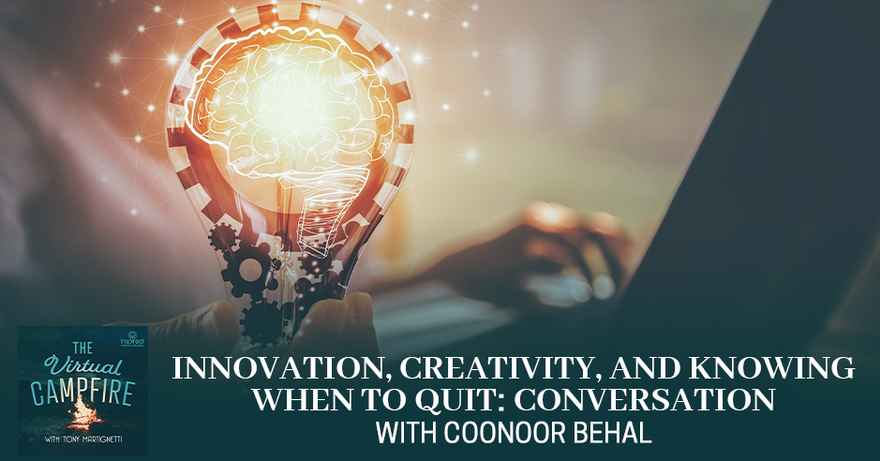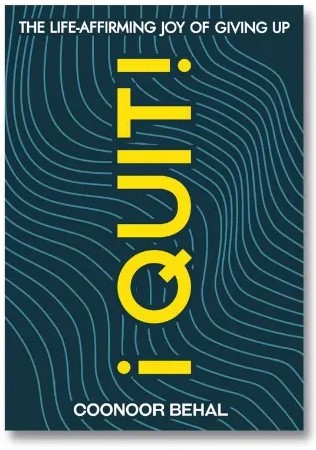Innovation, Creativity, And Knowing When To Quit: Conversation With Coonoor Behal

Quitting might often seem like giving up, like surrendering, but sometimes, it is the best thing you can do. Whether it’s leaving your job to chase a dream, leaving an abusive relationship or quitting to go after something better, quitting is not always a bad thing. Tony Martignetti sits down for a conversation with author, keynote speaker and design strategist and researcher Coonoor Behal as she navigates her time as a student and her stint in international nonprofit organizations. She shares her thoughts on quitting and why you shouldn’t always see it as a negative. Finally, she discusses human-centered innovation and improving yourself.
---
Listen to the podcast here:
Innovation, Creativity, And Knowing When To Quit: Conversation With Coonoor Behal
It is my honor to introduce you to my guest. Coonoor Behal is the Founder and CEO of Mindhatch, a consulting and training firm that helps companies and organizations create the conditions for innovation and creativity to thrive. She’s also the author of I Quit! the Life-Affirming Joy of Giving Up which will be published in April 2021. She has been doing improv comedy for years, loves professional tennis, and she’s obsessed with her Bernese Mountain Dog named Nikka.
---
I want to welcome you to the Virtual Campfire.
Thank you for having me. It’s warm and toasty. It’s great.
I love it when people say that because that’s the environment we’re trying to go for here. Get people comfortable to share what’s on their mind and to explore what brought you here in terms of doing this great work in the world and your exciting new book, which I love the title. To give you a little context as to how we roll on the show, we will allow you to explore your story through what’s called flashpoints. These are points in your life that have ignited your gifts into the world. There could be one or there could be many. They don’t have to be anything too drastic and life-challenging if you will but there are things that have shown up in you and made you think that “the things have to be different in my world.” I’d love to hear from you what are those moments that have brought you to where you are doing these amazing things in the world.
I’m a design researcher, so I love open-ended questions. The flashpoints, there’s a lot. It’s easier to make me think of the most recent flashpoints that helped me refine who I am and how I see my place in the world. That has got to be the 2016 Presidential Election. I often say that the first time I ever needed to confront or contend with the fact that I am a woman was in my first job when I was treated very differently because of that. The first time I ever needed to confront and contend with being a person of color was the 2016 election where I suddenly felt so exposed and honestly not safe because of the way that I looked.
That was definitely a flashpoint that in subsequent years, I’ve got a little bit more serious and intentional about what can I do for the world and particularly, for people of color and systems. It turned me around and thinking about what systems do and supporting those systems. I’m an entrepreneur. I didn’t like working within systems. I didn’t like working within a bureaucracy. That being said, when it comes to things like public and social services, it pitched for me that this needs to change. It led to me being more intentional about what my business is putting out into the world even though I’m a solo entrepreneur. What influence do I have? How and when can I use it? I was being attuned to that.
I love the way you described that. First of all, about the systems piece, because there’s an element of sometimes the system needs a catalyst to start moving it towards a better system. One person can be that catalyst. It’s been proven throughout history that there’s been one person who can start a movement and ultimately change minds, one person at a time, which is a powerful sentiment. Part of what you started to do with the work that you’re doing is that one person working with the passion of what you have thinking differently.
You can make big life decisions without causing the world to fall apart.
Thank you. I appreciate that. Do you want me to go on with other flashpoints that come to mind?
I’d like to take a step back though. You started in a very interesting place. Obviously, that was a place that a lot of people felt like they were awoken in this 2016 election and all the things and the events that have taken place since then. What I want to do is I want to take you further back. What were your studies in school?
My formal studies have nothing to do with what I’m doing now, which I’m so proud of. In my undergrad, I studied Journalism, Politics and Film. In my graduate school, I got a Master’s Degree in International Relations.
Very interesting and very eclectic in terms of your background. As you got further along, what drove you into your first roles as you got into the workforce?
The first driver was me saying no to a long-held aspiration I had. I was a Journalism major in college because I wanted to be in liberal arts school, but I want to be an entertainment worker. I thought I wanted to be a producer or a writer, maybe something a little bit more on the business or development side of entertainment. I wanted to do that since I was three years old. My aunt tells me that when I was really young before I even have memories, she’d say, “What are you going to do, Coonoor?” I’d say, “I’m going to Hollywood.” It was on the brain from age three until I was 21 and about to graduate college.
It suddenly dawned on me like, “I don’t want to live in Los Angeles. I don’t want to have to own a car.” There were a lot of things that went into it, but I made it an abrupt shift into this thing I thought I wanted to do. Suddenly, I’m confronted with making big life choices to allow me to try doing that and I don’t want to make those choices. I also studied politics and was interested in international anything that led me to grad school. Classic going to grad school for when you have no other ideas. That obviously reoriented me toward what I thought would be a lifelong career of working in international non-profit development and being a social do-gooder within a system for the rest of my life. Three months into that job, I got sexually harassed. I was like, “Maybe culture and all these other things that I now know are more important to me than mission-oriented work.”
Hearing a lot of this path that you’re going down, for some reason, everything’s paid for the good intentions. You have this thought that you’re like, “I’m going to be on purpose. I’m going to do these right things.” Then you realize that sometimes you have to be able to adjust course, sometimes unintentionally because of the fact that there are things that happened to you that you can’t control and things that you don’t like about the situation you’re in.

In a weird way, it’s appropriate. Where I ultimately ended up is doing something human-centered innovation now. Both because I had many different careers and many different experiments with my career that I rapidly iterated it, refined it and got to where I am. I’m very happy. I also think about quitting things where I grew up like most of us do, where we think life is linear. You do the thing and then you get the thing. That was work for me up until I started working in the workforce when suddenly all these other things besides merit matter.
It’s interesting, in my innovation work, we talk about based on the amount of information and knowledge you have about your customers’ wants, needs and desires. The amount of information and learning you have should correlate to how much time, money and resources you invest in your prototype. If you know a ton, make it much more refined in your final prototype. If you have talked to ten customers for an hour each, your prototype should not be costing you thousands of dollars.
There’s this correlation between knowledge and fidelity. In talking about my experience quitting my first couple of careers, I got new information that I didn’t have before. I got new knowledge about what was, at that time, my chosen fields that I could not have known without being in those fields. Along the way, I also got more information about myself, what matters to me, what I can live with, and what I can’t live with. It makes sense as you collect more and more information about your situation and yourself. You should be empowered to make new decisions and further refine the prototype that is your life. Unenjoyable things happened along the way. Don’t get me wrong, but I also view you back on those things very gratefully like, “Thank, God, I learned that about the non-profit international development world early as opposed to ten years in.” I like learning things fast.
There was something you said there that there was powerful. You said, “Taking the prototyping model to life into your life.” It’s so true. That’s so powerful for people to hear because there’s an element of that, that people are afraid to take those risks in different things, but also knowing when to quit. Having the range of things that you’ve done is powerful because it allows you to see. I want to test this out on you to see if this feels right. Intuition gets strengthened by the ability to have different experiences. When you’ve seen a lot of things, you start to see that you can make better instinct decisions because you’ve seen a few different places where this plays out.
Not to bring us down again but I got divorced in 2020. I remember when I was updating my older brother about what had been going on and why I made the decision, he said to me that a lot of people say, which is like, “Life is too short to be unhappy.” I immediately was like, “No. Life is too long if you were privileged enough to live in the Western world and have a roof over your head.” My grandmother passed away in her late 90s. I got a lot of life ahead of me. Do I want to spend it unhappy or do I want to make a decision and make the many years I have ahead of me better? I feel like, “Life is too short. It’s long.” You don’t want to be stuck in something that you’re not happy with for that long. I told my brother, I was like, “If I knew I was going to pass away a year from now, then I would’ve stayed married, but I don’t know that to be true.”
I love the way you’ve put that because it’s a different take on the same thing. It gets you thinking that life is short is this element of, “Do whatever you need to do to be happy.” At the same time, life is long too, especially in this day and age when we start to continue to work and innovate towards this better medicine, better lifestyle towards living longer. Why waste even anytime being unhappy?
I think of it also as what you are committed to. The sense of like, “Do you need to stick it out as for sticking it out or commitment for commitment’s sake.” I’m happy I learned early in my life that I can make big life decisions and the world doesn’t fall apart. I’m like, “I’m okay.” I’m very passionate about not living my life with inertia. A metaphor I’ve used before, which God knows if it’s good metaphor and I’m not good at those, do you want to be bobbing up on the waves of life. Do you want to start treading water, even swim or direct yourself, and make a decision on what direction to go to? I realized early on I’m not content to bob along the way the waves are taking me.
Quitting does not connote the absence of something in your life. You replace it with something that serves you better.
It makes me think of another metaphor. I love the one you use but this thought of the author versus the reporter. This element of you’re like, “I’m going to be an author soon.” This whole concept of being in the driver’s seat, the author of your day versus the reporter of your day, and why do you want to let it dictate where you fall out versus taking it by the driver’s seat and say, “Let’s go. Let’s make something happening.” Even if I fail, it doesn’t mean that nothing is permanent.
I want to also be very upfront with something I’ve learned in the past one year myself, especially in writing my book, which is that some things in life that you quit are acts of privilege. I don’t want to be all woo-woo about, “Quit everything. Damn the consequences.” Especially when it comes to jobs and relationships. I remember when I decided to quit my marriage, flood of gratitude came over me because it was like, “I’m making this decision and I know I will have a roof over my head. I know that I don’t have children to worry about. I know I don’t have to worry about hiding from an abuser.” I was awash with privilege and it made me realize how lucky I was to even make that decision. I don’t want the inverse of what we’re talking about to be critical of people who don’t have the privilege to quit certain things. There are definitely things that you can quit that don’t require privilege. There are lots of things in life that you can make decisions about as opposed to going along with whatever you have.
I have this urge because what you’re talking about is so powerful in the sense that it’s about making decisions around your level of commitment to whatever it is that you’re doing right now. Whatever you are looking, it’s either say yes to or no to. If you’re a no to whatever you’re doing whether it’s your marriage, the job or anything, then there’s no sense in stringing it along. Let’s call it faking it, for lack of a better word. I’d love to dig more. My inclination is to find out more about in the book without giving away all the context of what it is. What are the big things that you bring up around quitting that you want to share?
The book is definitely not a how-to-quit book. I want to say that because I would never deign to tell someone how to quit. It is a very personal decision to do it and how you do it. The book is my stab at getting people to rethink, reframe quitting, get us to remove the stigma, and the shame that is so often placed on quitting. We equate quitters with failure or “you couldn’t stick it out.” It’s a character flaw, which I don’t agree with. The book is a small entry into trying to get people to think differently about quitting. The way I do that is by telling other people’s stories. I interviewed nearly 40 people and each chapter is one of their stories and about things that they quit. There are stories about quitting jobs and careers. There are stories about quitting people and relationships, quitting identities, and quitting aspirations. There’s another one I’m forgetting. I’m in the revision process. Anything I told you could end up not being true by April 2021.
It’s telling their stories and then weaving in my own personal narrative and memoir within each story. It’s the process of sharing other people’s stories and reflecting on quitting and things in my life. Some things that I have learned honestly from the people I talk to was that while these people have no regrets, the only regret that anyone brings up is, “I wish I had done it earlier. I wish I hadn’t waited so long.” Many of the people I spoke with, the quitting stories they shared with me happened to be the first time that they quit something.
This topic attracted a lot of recovering perfectionists and people trying to get over living their lives for other people and not themselves. One thing I learned about them was that once they had this first big quit, the heavens opened. They’re like, “This was so great. None of my worst-case scenario of fears came true. The world has opened up many more opportunities and possibilities for me.” Now, they want to quit many other things. The scar tissue was removed and they were like, “I get to do this all the time now.” That was definitely a trend and something that I learned. It was that old Pringles commercial like, “Once you pop, you can’t stop.” This always comes to my mind. That has come up a lot and there are a lot of different themes within each person’s stories. There are different things that come up for sure. That I definitely take away.
I’m starting to think about what do I want to quit. It’s funny because you can open up a whole quit tsunami that shows up. There’s this element of so many people who are addicted to doing. That’s what came to me. I’m like, “I want to quit doing so much and start being.” I want to replace my quitting, but I want to replace it with something good, so that it has this powerful energy towards it.

I love the word that you used, replace, because that’s another thing that the people I spoke to realize. Quitting does not connote the absence of something in your life or a void. You replace it with something that is serving you better. A very common thing from people I interviewed, a common phrase they would use was, “This wasn’t serving me any longer.” I was surprised at how often that came up across the interviews. As an observer, you might think, “If you’re only focusing on things that serve you, aren’t you selfish? You’re self-involved.” That’s not true.
Also, there’s this interesting dynamic where these quitters I spoke to would say things like, “It wasn’t serving me any longer,” but then part of their decision often was an act of generosity where it was like, “I quit this because I knew my company had someone to replace me and that they would be fine,” or “I quit this because there was someone better who could take my place.” It’s an interesting dynamic of you can think of yourself and prioritize yourself without ruining other people around you.
Something that came to mind is that you talked about perfectionists earlier. Sometimes, perfectionists will quit competing if they feel like they can’t win the game. I’m not sure if that showed up at all during your conversations, but it’s something that came to mind.
It doesn’t ring a bell for my book, but it totally describes me in college. I thought I wanted to go to law school. I already had a high GPA. I spent my last year and a half of college trying to preserve my GPA to give me the chance of getting into a good law school. I wish I hadn’t done that. I wish I had taken classes that interested me and not worried about if I would get an A or a B in them, and that sort of thing. It’s also quite a bit the origin story of me doing improv. I officially started and had been improv since my late 20s, but my first attempt was in college when I was 19. I went to my first class and, honestly, I was scared to be bad at it, so I never went back. I paid for an eight-week class. I went to the first one and I never went back. I quickly learned that I was scared to know I was bad at something. I’m glad I’m not that perfectionistic 19-year-old anymore.
I have to take you back into your story for a moment and ask how does your experience with quitting reflect on your family history. For example, when you first changed your career or your major in school, was that something that was frowned upon by your parents or by your family? Tell me about that.
There’s a lot there. I have unexpectedly found occasions to write about that in the book and it’s interesting. It’s hard for me as a child of immigrants to know what is my culture and what is my parents’ personality. I’m going to preface that. The truth is that my parents are way more non-traditional than a lot of South Asian parents. They’re way more modern even. That being said, I, in my own life, with my quits, my pivots in life, and my very non-linear approach to my life, I definitely have learned through that that my parents are not risk-takers at all. My dad, he grew up in East Africa and I remember him saying when he was in eighth grade, he had to decide if he was going to be a doctor, a lawyer or an engineer. From that time on, his entire schooling was devoted to that. He ended up being a doctor.
It’s interesting that a lot of children of immigrants in the United States, we do suffer from this. You have to get good grades. You have to do the right thing and work hard. It’s that why you’re told that hard work always pays off. My dad especially is very risk-averse and very nervous anytime one of us kids makes a change or anything that. It’s baffling because it’s like, “You and my mom moved two oceans away from your family to start your life, and you’re worried every time I moved to another state.” My dad had to flee a murderous dictator and I don’t blame a parent for wanting something different for their kids. I don’t blame them, but it’s also you think that they have a better stamina for change.
You have more agency than society has led you to believe.
First of all, thank you so much for sharing that because I can totally see that. My parents were immigrants as well and I can relate with that context. Not exactly but close to it. Now, as time goes on, especially over the past years, a lot of us have gone through some elements of seeing that we can tolerate a lot. We can go through a lot. The pandemic has tested the strain of all of us and let us see that we’re capable of so much change. This is going to be the new normal if there is one. Change is absolutely constant.
I’m a fan of, “It’s the new reality.”
It’s even better.
What is normal?
Nobody wants normal anyway, so I like that.
What are you benchmarking against? Who knows?
What are the things that are your key takeaways from your story that you want to share with people that you’ve learned about yourself?
I want to phrase it as what I’ve benefited from. I’ve benefited from having a strong sense of self, even if they have changed over the years. At any one point in time, I usually knew what my values were, what I stood for. By and large, I was able to live those values, so that has benefited me well. Not having a lot of pride has benefited me well. I have self-worth but not pride. Those are two different things. Isn’t pride 1 of the 7 deadly sins? I have no idea. It is, right?
 Yes.
Yes.
I watched years ago, so that’s the only way I would know that. Having self-worth but not letting pride get in the way. I’m super quick to apologize. People might think I’m stubborn, but I’m like, “Give me new information to change my mind.” I’m very amenable to new information as I have it through my whole life. that has served me well. also experimenting, having a good sense of what doesn’t have to be forever. That’s a lot of things in life. You have more agency than society has led you to believe.
That’s a word that we don’t use very often, but I love that because it’s a powerful word, agency. It gives you this ability to see it as like, “I am in power of this. I have the control of this.” That was great. I appreciate you sharing that. They’re amazing insights. I have one last question for you and that is, what is one book, if you want to break the rules you can say more than one, that has had an impact on you and why?
At the start of our conversation, we’re talking about systems. A book that stands out to me is a book called Winners Take All: The Elite Charade of Changing the World. That blew my mind because it was taking down who I was years ago when I wanted to be a social entrepreneur, a social innovator, and work outside the system to make the lives of those more vulnerable than me better. I ended up not going into social entrepreneurship but not necessarily for the reasons that this book describes. That book was powerful because in the intervening years, I also had come around especially at the 2016 election. It was one of those books where you’re like, “Yes, that’s right.”
It’s supportive of, by way of example, we already have a government apparatus. There’s already a system created to help those more vulnerable than us. We don’t need to be creating additional side systems, especially when those systems are built by billionaires. Why don’t you pay your taxes so the government can function properly? Everyone is a cowboy. Everyone is an entrepreneur. Some things already have the right system to create the change that you want. That’s a small takeaway from that book, but I highly recommend it. It was delightful to read someone takedown and dissect a previous aspiration I had. It was gleeful for me to read it.
It’s to know how wrong you could be. It goes back to your pride thing. You’re like, “I don’t have to hold onto my pride so strongly.”
I feel like writing a letter to the author I’m like, “I’m disagreeing with him.”
This has been so amazing. I can’t thank you enough for coming on the show. This has been fun.
Thank you.
It’s been great knowing your story and the great insights. Thank you so much for coming on.
Thank you for having me. Your curiosity, I so appreciate it. I’m so grateful.
I’m looking forward to digging into your book and sharing it with everyone who is in my universe. I’ll be sure to grab some copies. I want to make sure people know where they can find you. Where’s the best place that they can reach out and find you?
A couple of different places. If you’re interested in the book, you can go to IQuitBook.com and you can pre-order as well there. You can also hire me to speak if you like and you can learn about my innovation and creativity work at MindhatchLLC.com. Mindhatch is the name of my company. Please feel free to find me on LinkedIn and follow me there. I post a lot about quitting and innovation there as well. My name is easy to find. I’m the only one on LinkedIn.
Again, thank you so much for coming on. This has been amazing. I want to thank the audience for coming on the journey with us. I know you’re leaving with some great insights.
Important Links:
- Mindhatch
- I Quit! the Life-Affirming Joy of Giving Up – Amazon
- Winners Take All: The Elite Charade of Changing the World
- LinkedIn – Coonoor Behal
About Coonoor Behal

Coonoor honed her creative problem-solving skills during her years as a strategy and innovation consultant at Deloitte Consulting LLP. For part of her time there, she worked in the firm’s Global Innovation Network, spearheading and managing open innovation challenges across more than 100 member firms.
With years of experience as an improv comedian and teacher, Coonoor brings levity, adaptability, and composure to every experience and is an expert in using improv techniques to enhance collaboration and ideation. Prior to her creative business career, Coonoor worked in nonprofit international development.
Love the show? Subscribe, rate, review, and share! https://www.inspiredpurposecoach.com/virtualcampfire


0 comments
Leave a comment
Please log in or register to post a comment